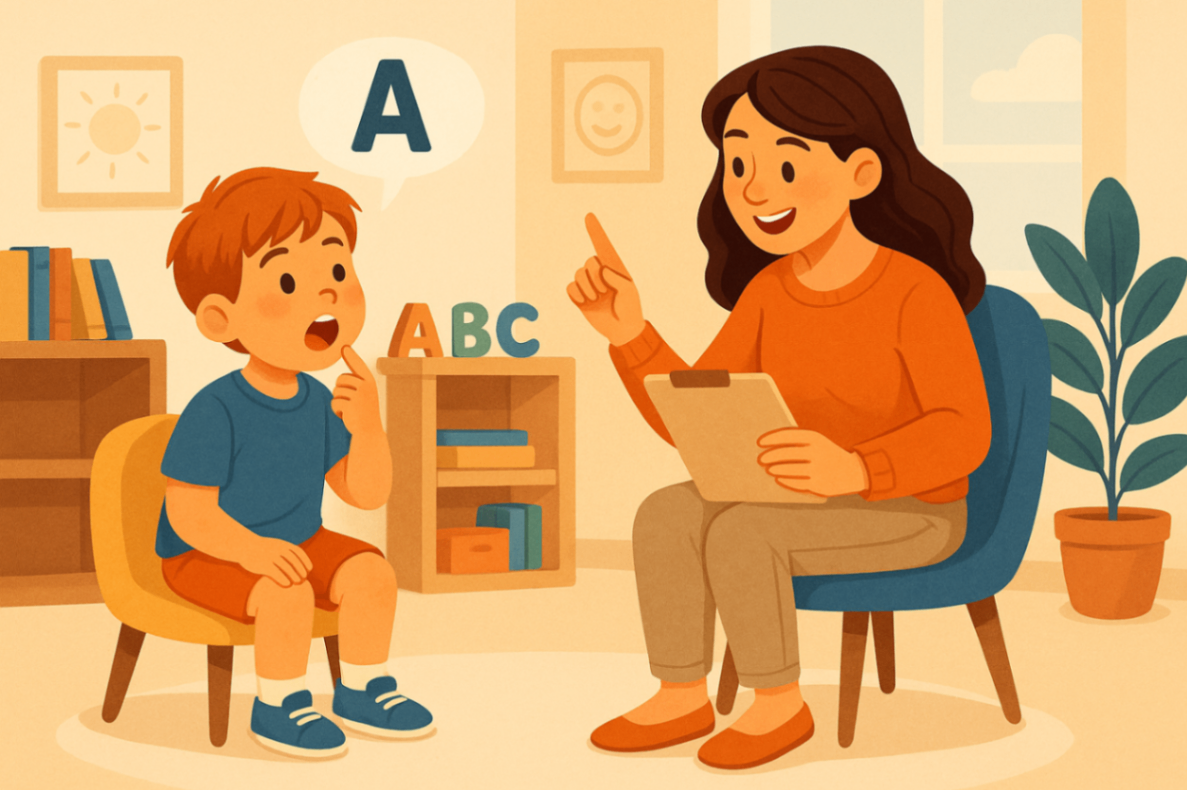
speech therapy for children: funding solutions via ndis
24 July, 2025
Introduction
Speech therapy helps children get past language problems and build good communication skills. These skills are important for both school and talking with others. Some children can have trouble with saying speech sounds or may have a communication disorder. If they get help early, there can be a big change in how they do. It is useful for children to get help from a professional. This can be with learning sounds or knowing how to take in information (receptive language). The National Disability Insurance Scheme (NDIS) gives funding, so these services can be for more families. With the right help and support, your child can make real progress in speech and language.
Key Highlights
-
Speech therapy supports children in overcoming communication challenges, enhancing language development, and building articulation skills.
-
Common speech and language disorders in children include fluency and receptive disorders, articulation challenges, and expressive language issues.
-
The NDIS (National Disability Insurance Scheme) provides funding solutions for eligible individuals to access speech therapy services, including language intervention activities.
-
Families can incorporate speech therapy into individualised NDIS plans tailored to their child’s needs.
-
Choosing qualified speech therapists ensures effective treatment with approaches designed for specific communication disorders.
-
Early intervention, facilitated through NDIS support, can significantly improve speech and communication skills in children.
Understanding Speech Therapy for Children
Speech therapy for children is not just about fixing speech problems. It also supports overall language development and improves communication confidence. Articulation therapy teaches kids how to pronounce sounds correctly, while language therapy helps them understand and use words effectively.
There are many reasons a child may need speech support. Some children experience delays in hitting language milestones, while others face challenges due to hearing loss or conditions like autism. A qualified speech pathologist uses structured and play-based strategies to help children improve vocabulary, pronunciation, and comprehension.
Whether your child is struggling with receptive language or has difficulty with speech sounds, speech therapy for children is a vital intervention that can enhance social interaction, classroom learning, and emotional well-being.
What Is Speech Therapy and How Does It Work?
Speech therapy is about helping people who have trouble with speaking or understanding others. Speech therapists use special ways to do this. They choose what works best for each person. Some of these methods are articulation therapy, language intervention activities, and resonance exercises. Speech-Language Pathologists, or SLPs, usually have a certificate from ASHA. They check and work with people who have different kinds of speech or language problems.
When it comes to helping children, speech therapists often use games or fun tasks. These can be things like reading out loud or saying syllables. The goal is to make sure kids join in and learn, not just sit and listen. Adults take part in talks, learn new ways to get their message across, or work on brain skills with their speech therapist. Each session is made for what the person needs or what he or she has trouble with.
You may find the sessions cover more than one problem at a time. They can help with articulation, fluency, or understanding what others say. If someone has a cleft palate, aphasia, or another condition, speech therapy is adjusted just for them. The aim of speech therapy is not only to help a person talk or understand better. It is also about giving someone more confidence and helping them feel good at home or at work. By getting the right kind of help, people with speech or language issues can do better and feel good in their lives.
Common Speech and Language Disorders in Children
Children can have different speech and language problems. Each kind needs the right help. For example, with articulation disorders, a child may have trouble making some sounds. They might say “thith” when they mean “this.” Fluency disorders, like stuttering, can make speaking feel hard or bumpy. Cluttering means speaking too quickly, so words run together.
Receptive disorders make it hard for children to understand what people say. Some cannot follow directions or know many words. Resonance disorders happen when something blocks sound in the nose or mouth. Swollen tonsils or cleft palate can cause these problems. These changes affect the way a child’s speech vibrations sound.
Some children also have hearing impairment, aphasia, or voice disorders. These can make using words or building vocabulary harder. For example, if a child cannot hear well, it can be very hard to learn new words. Each of these issues can make it tough for children to develop good communication skills. Therapy helps children get better at talking and understanding others. With support, they can do well at school and feel sure of themselves when they speak.
What types of speech disorders can be treated with speech therapy for children?
Speech therapy for children can effectively address various speech disorders, including articulation disorders, fluency issues like stuttering, language delays, and voice disorders. Early intervention through tailored therapies helps children improve communication skills, ensuring they express themselves clearly and confidently in social and academic settings.
The Role of NDIS in Supporting Speech Therapy

The National Disability Insurance Scheme (NDIS) helps families with the costs of speech therapy. NDIS gives funding to help children who have trouble with speech, such as hearing loss or resonance disorders.
Families work with experts to make plans that fit what their child needs, so they get the right language therapy. Because NDIS keeps helping with money, providers are able to give steady care. This support helps children to work on and reach their speech and language therapy goals.
What Is the NDIS and Who Is Eligible in Australia?
The NDIS, also called the National Disability Insurance Scheme, is from the government in Australia. It is made to help people who live with disabilities. To get help from the NDIS, a person needs to have a disability that is permanent or really affects daily life. This can include nervous system disorders, head injuries, ALS (amyotrophic lateral sclerosis), or sclerosis.
The scheme helps both children and adults. People who need speech therapy for problems talking, or have a communication disorder, can get support. It makes sure everyone gets a fair chance to use resources made for delays or issues in development.
When someone goes for an assessment and has things like articulation disorders or trouble understanding others, they can get funding to help them get better. The NDIS helps people solve these problems and improve their communication skills. By doing this, the scheme makes it easier for people with speech and language issues to be included in daily life.
Types of NDIS Funding Available for Speech Therapy
NDIS has different types of funding for speech therapy. These are picked based on how severe the problem is and what therapy is needed. Here is a simple table with examples:
|
NDIS Funding Type |
Coverage Areas for Speech Therapy |
|---|---|
|
Core Supports |
Everyday help with speech therapy and teaching families how to do activities |
|
Capacity Building Supports |
Helping you get better at things like language development and grammar |
|
Capital Supports |
Giving tools like speech-generating devices to help you talk |
Core Supports are good for real-life practice, like joining in a small group. Capacity Building works well if you want to grow your language skills over time. This is helpful for people with communication disorders. Capital Supports give you new technology, making language therapy easier.
No matter which support you get, NDIS gives families the chance to work with trained speech therapists (SLPs). This makes sure you or your loved one gets speech therapy and language skills support that truly fits your needs.
Accessing Speech Therapy Services Through NDIS

Getting speech therapy with NDIS makes it easy to find the help you need. Children get to try out many speech therapy techniques. These include learning through play and also using sign language. There is a choice between one-on-one sessions or being in a small group.
Families are included, too. They can work with therapists to help their child build better communication skills. When you add therapy into your NDIS plan, you keep things on track and get support from experts. This helps with speech and language development, and you have guidance the whole way.
Steps to Include Speech Therapy in Your Child’s NDIS Plan
Incorporating speech therapy in your child’s NDIS plan takes a few important steps:
-
Seek an evaluation: Talk to an SLP to check your child’s communication skills and find out what speech therapy is needed.
-
Discuss with NDIS planners: Share details about your child’s needs. Talk together about the best way to get speech therapy services.
-
Utilise funding options: Use Core Supports funding for regular therapy or choose Capacity Building to help make language development and new skills stronger.
-
Monitor progress: Watch how things go. Change the plan during reviews to keep up with what your child needs now.
These steps help you get what you need, like small group therapy, which is great for language development. When you and the NDIS team work together with other service providers, you make sure your child gets the right support in their care plan.
Tips for Choosing the Right Speech Therapist
Choosing the right speech pathologist plays a key role in your child’s success with therapy. Look for professionals who:
-
Are certified and experienced in providing speech therapy for children with your child’s specific condition.
-
Offer personalised plans that target the child’s communication goals.
-
Use engaging tools and activities that suit your child’s learning style.
Trusted speech pathologists will also keep you involved in the process, helping you support your child’s development both during and outside of therapy sessions.
Conclusion
To sum up, working with the NDIS for speech therapy can really help your child improve their communication skills. This can make life better for both your child and your family. It is important to understand what types of funding the NDIS offers, who can get it, and how to include speech therapy in the NDIS plan. When you know about these things, you can make good choices and get the right help and resources for your child’s needs. Learn as much as you can, talk with the right professionals, and use the NDIS so your child can do well with language development and speech therapy.
Ready to get started with speech therapy for children through NDIS? Speak with a qualified speech pathologist at daar today. We offer personalised support for families across Liverpool, Canterbury, and nearby suburbs.
Frequently Asked Questions
How do I apply for NDIS funding for my child’s speech therapy?
To apply for NDIS, you need to send in an application. This form should show that there is a need because of disability. Be sure to talk to your planner about adding speech therapy to the plan. It’s also important to include reports from skilled speech-language pathologists. If you plan early, you can help make sure your child gets the right therapy services they need.
What costs will NDIS cover for speech therapy?
NDIS funding helps pay for speech therapy costs. This can include help from an SLP, devices that help with talking, and language therapy sessions. You can get money to use for one-on-one therapy, help for your child’s growth, or small group activities. Look at the type of funding in your plan to know what is covered.
Can I choose any speech therapist, or must they be NDIS-registered?
You can choose to work with registered NDIS speech therapists for therapy. These approved experts give good care. They also help you use your funding with no trouble. You can count on their skills. It is good to pick speech therapists who know how to fix communication problems well and fast.
How often can my child receive speech therapy under NDIS?
How often your child goes to speech therapy depends on their NDIS plan and what they need. Most sessions happen once a week or every two weeks. The SLP usually suggests what is best. Your NDIS planner will look at how your child is doing and may change how often sessions are to get the best results.
What should I do if my child’s needs change during the NDIS plan?
If your child's needs change, you can ask NDIS for a review of their plan. You may need to change therapy goals or the amount of funding based on updated tests. Talk with planners and SLPs. Work together to help your child keep moving forward, especially if there are new challenges with their growth or talking.
.svg)






